
CELL AND TISSUE RESEARCH
Scope & Guideline
Unveiling Cellular Mysteries through Rigorous Research
Introduction
Aims and Scopes
- Cellular Mechanisms and Signaling:
Research on the molecular pathways and cellular mechanisms that govern cell function, differentiation, and responses to stimuli. This includes studies on signaling pathways, gene expression, and the role of various proteins in cellular processes. - Tissue Regeneration and Repair:
Focuses on the biological processes involved in tissue repair and regeneration, including the role of stem cells, extracellular matrix interactions, and regenerative medicine approaches. - Comparative Biology and Evolution:
Investigates cellular and tissue structures across various species to understand evolutionary adaptations and functional similarities, often employing model organisms for comparative studies. - Neurobiology and Neurodegeneration:
Examines the cellular and molecular basis of neurobiology, including neuronal differentiation, neurodegeneration, and the role of glial cells in neural health and disease. - Histology and Ultrastructure:
Involves detailed histological and ultrastructural studies to elucidate the organization and function of cells and tissues, contributing to a deeper understanding of their physiological roles. - Stem Cell Research and Therapeutics:
Explores the potential of stem cells in regenerative medicine, including their differentiation, therapeutic applications, and challenges in clinical settings.
Trending and Emerging
- Regenerative Medicine and Stem Cell Therapy:
Research focused on the therapeutic applications of stem cells and regenerative medicine is significantly increasing, highlighting the potential for cell-based therapies in treating various diseases and injuries. - Microenvironment and Extracellular Matrix Interactions:
Emerging studies emphasize the importance of the cellular microenvironment and extracellular matrix in regulating cell behavior, with a focus on how these interactions influence tissue repair and regeneration. - Neuroinflammation and Neurodegeneration:
There is a growing interest in understanding the roles of neuroinflammation and cellular interactions in neurodegenerative diseases, reflecting an increased focus on the neurobiology of aging and injury. - Applications of Advanced Imaging Techniques:
The integration of advanced imaging techniques, including high-resolution microscopy and 3D imaging, is on the rise, providing deeper insights into cellular structures and dynamics. - Functional Genomics and Proteomics:
Research utilizing functional genomics and proteomics to explore cellular functions and interactions at a systems biology level is becoming more prevalent, offering a comprehensive understanding of complex biological processes.
Declining or Waning
- Traditional Histopathology:
There is a noticeable decrease in publications focusing solely on traditional histopathological techniques without the integration of modern molecular or imaging technologies, as the field shifts towards more advanced methodologies. - Basic Cell Culture Studies:
Research that primarily utilizes basic cell culture without exploring more complex models such as 3D cultures or organoids is becoming less common, as there is a growing emphasis on more physiologically relevant systems. - Invertebrate Model Research:
The use of invertebrate models, while still relevant, is experiencing a decline as research increasingly focuses on mammalian and human systems that may yield more directly applicable insights for clinical research. - Tissue Engineering Without Functional Outcomes:
The focus on tissue engineering studies that do not assess functional outcomes or integration into biological systems is diminishing, reflecting a shift towards studies that emphasize the functional implications of engineered tissues.
Similar Journals

npj Regenerative Medicine
Exploring Breakthroughs in Regenerative Science.npj Regenerative Medicine, published by NATURE PORTFOLIO, is at the forefront of research and innovation in the field of regenerative medicine, fostering a deep understanding of cellular and molecular processes that can be leveraged for therapeutic advancements. Launched as an Open Access journal since 2016, it ensures wide dissemination of knowledge, allowing researchers, professionals, and students to access high-quality articles without barriers. With an impressive impact, it holds Q1 ratings across multiple categories including Biomedical Engineering, Cell Biology, Developmental Biology, and Medicine (miscellaneous) as of 2023, indicating its critical role in shaping contemporary scientific discourse. The journal ranks notably within the top 10% in multiple Scopus categories, indicating its commitment to publishing pioneering research that addresses pressing challenges in regenerative therapies. Addressing the dynamic convergence of disciplines, npj Regenerative Medicine is poised to not only impact academic thought but also translate into clinical applications, making it a pivotal resource for those invested in the future of medicine.
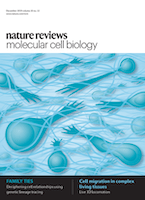
NATURE REVIEWS MOLECULAR CELL BIOLOGY
Unveiling the complexities of life at the molecular level.NATURE REVIEWS MOLECULAR CELL BIOLOGY, published by NATURE PORTFOLIO, stands as a seminal journal in the fields of cell and molecular biology, with a significant impact factor that underscores its influence and reputation within the scientific community. Established in 2000 and continuing its legacy into 2024, this journal delivers comprehensive reviews that synthesize current knowledge and advancements in molecular and cellular processes. Respected for its high-quality articles, it has maintained a prestigious Q1 ranking in both Cell Biology and Molecular Biology categories as of 2023. With an exceptional Scopus ranking, taking the top position in its category, it attracts a readership of prominent researchers, professionals, and students eager to stay abreast of groundbreaking discoveries and methodologies. Although it does not offer Open Access, subscribers benefit from exclusive access to vital insights that foster innovative research approaches and advancements in the life sciences. The journal’s objective is to bridge the gap between research and application, providing indispensable resources to its audience while contributing to the global conversation on molecular and cellular biology.
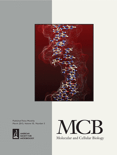
MOLECULAR AND CELLULAR BIOLOGY
Bridging Knowledge Gaps in Molecular BiologyMOLECULAR AND CELLULAR BIOLOGY, published by TAYLOR & FRANCIS INC, stands as a preeminent platform for researchers, professionals, and students engaged in the dynamic field of molecular and cellular biology. Established in 1981 and ongoing into 2024, the journal features cutting-edge research that spans across vital sub-disciplines, garnering a strong impact in its contributions to the scientific community. With an impressive Q2 ranking in Cell Biology and Q1 ranking in Molecular Biology for 2023, it consistently publishes high-quality articles that reflect the latest advancements and discoveries within the field. The journal is particularly well-regarded for its rigorous peer-review process and commitment to scientific excellence, making it an invaluable resource for those seeking to deepen their understanding of molecular mechanisms and cellular processes. Although not open access, the journal offers diverse access options for researchers to reach the latest findings. By maintaining a strong focus on biochemistry, genetics, and molecular biology, MOLECULAR AND CELLULAR BIOLOGY remains essential reading for anyone looking to contribute to or stay informed about significant developments within this pivotal area of study.

Journal of Stem Cells & Regenerative Medicine
Unlocking the Potential of Stem CellsThe Journal of Stem Cells & Regenerative Medicine is a leading publication dedicated to the advancing field of stem cell research and regenerative medicine. Established in India and published by JOURNAL STEM CELLS & REGENERATIVE MEDICINE, this Open Access journal has been available since 2007, providing researchers and practitioners with free and unrestricted access to high-quality articles. With an ISSN of 0973-7154, the journal is indexed in Scopus, featuring a wide array of topics and insights into biochemistry, biotechnology, cell biology, and molecular biology, as denoted by its relevant quartile rankings. This journal is committed to bridging the gap between laboratory research and clinical applications, making significant contributions to the scientific community. The convergence of innovative studies from 2010 to 2024 positions it as an invaluable resource for those looking to stay at the forefront of stem cell and regenerative medicine research.
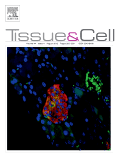
TISSUE & CELL
Connecting Research to Real-World ImpactTISSUE & CELL is a prominent academic journal, published by CHURCHILL LIVINGSTONE, that has been at the forefront of research in the fields of cell biology, developmental biology, and miscellaneous areas of medicine since its inception in 1969. With a strong focus on high-quality research, TISSUE & CELL has established itself within the academic community, holding a Q3 ranking in both Cell Biology and Developmental Biology, and a Q2 ranking in Medicine as of 2023. The journal aims to disseminate significant findings that contribute to the understanding of tissue structure and function, helping to bridge the gap between basic biological research and clinical applications. While it operates on a subscription basis and does not currently offer Open Access options, the journal remains a vital resource for researchers, professionals, and students interested in cutting-edge developments in the biological sciences. The journal's address is located in the scenic city of Edinburgh, further establishing its academic heritage in the United Kingdom.

Cell Regeneration
Advancing the Frontiers of Cellular DiscoveryCell Regeneration, published by SPRINGERNATURE, stands at the forefront of biological research, focusing on the dynamic field of cellular development and regenerative biology. Since its establishment in 2012, this journal has embraced an Open Access model, facilitating widespread dissemination of key findings and fostering collaboration among researchers in the Netherlands and beyond. With an impact factor underscoring its significance, Cell Regeneration is positioned in the Q2 category in both Cell Biology and Developmental Biology as of 2023, ranked #32 out of 82 and #170 out of 285 in relevant Scopus peer fields. The journal encompasses a broad spectrum of research that advances our understanding of cellular processes, offering vital insights into regenerative mechanisms and their applications in therapies. This robust platform not only serves as a valuable resource for researchers, professionals, and students but also encourages scholarly dialogue and innovation in the fast-evolving landscape of cell biology.

BMC Molecular and Cell Biology
Connecting researchers through groundbreaking discoveries.BMC Molecular and Cell Biology is a forward-thinking open-access journal published by BMC, specializing in the vital fields of molecular biology and cell biology. Since its inception in 2019, the journal has carved a niche for itself, ranking in the Q3 quartile in both Cell Biology and Molecular Biology categories as of 2023. With an ISSN of N/A and an E-ISSN of 2661-8850, the journal provides a platform for groundbreaking research, high-quality reviews, and innovative methodologies. Situated in the United Kingdom, BMC Molecular and Cell Biology promotes a diverse range of studies, addressing fundamental questions in biology that resonate with both experts and new researchers alike. The journal's commitment to open access ensures that valuable findings are readily available to the global scientific community, fostering collaboration and knowledge-sharing across disciplines. Researchers aiming to contribute to the field of cell and molecular biology will find this journal an indispensable resource for both publishing and staying informed on the latest advances.

TRENDS IN CELL BIOLOGY
Uncovering the Latest Trends in Cell ScienceTRENDS IN CELL BIOLOGY, published by CELL PRESS, is a premier journal in the field of cell biology, recognized for its high-impact contributions since its inception in 1991. As a distinguished member of the Q1 quartile within its category, the journal holds an impressive Scopus ranking of #8 out of 285, placing it in the 97th percentile of the field, which underscores its reputation for excellence. The journal serves as an essential resource for researchers, professionals, and students who are engaged with groundbreaking advancements in biochemistry, genetics, and molecular biology. Although it is not open access, it provides critical insights into the latest trends, reviews, and advancements in cell biology, making it a crucial tool for anyone committed to understanding the complexities of cellular systems. With a focus on innovative and transformative research, TRENDS IN CELL BIOLOGY continues to shape the discourse in cell biology and enhance the scientific community's knowledge.
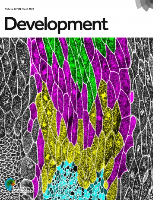
DEVELOPMENT
Advancing the frontiers of developmental and molecular biology.DEVELOPMENT is a preeminent journal published by COMPANY BIOLOGISTS LTD, headquartered in the United Kingdom. With an ISSN of 0950-1991 and an E-ISSN of 1477-9129, this esteemed journal has been at the forefront of the fields of Developmental Biology and Molecular Biology since its inception in 1987. Recognized for its rigorous peer review process and high-caliber research, DEVELOPMENT holds an impressive Q1 ranking in both disciplines as of 2023, underscoring its pivotal role in advancing scientific understanding. The journal is particularly noted for its contributions to the understanding of developmental processes, their molecular underpinnings, and their implications in health and disease. With a significant impact factor, DEVELOPMENT aims to disseminate groundbreaking research that inspires novel insights and future explorations within the biological sciences, making it an essential resource for researchers, professionals, and students alike. The journal also maintains accessibility for its readership, ensuring that significant research findings reach those who can apply and build upon them.
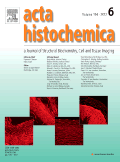
ACTA HISTOCHEMICA
Illuminating Cell Structures Through Rigorous Histochemical StudyACTA HISTOCHEMICA, a prestigious journal published by Elsevier GmbH, is dedicated to advancing the field of histochemistry and its applications within cell biology and medicine. With an ISSN of 0065-1281 and an E-ISSN of 1618-0372, the journal provides a critical platform for the dissemination of high-quality research findings and reviews, integral for both emerging and established scholars. Since its inception in 1954 and continuing through to 2024, ACTA HISTOCHEMICA has maintained a strong commitment to publishing significant advancements in histology and cell biology, as evidenced by its categorization in Q3 for Cell Biology and Histology, as well as Q2 in miscellaneous medicine for the year 2023. The journal ranks favorably in Scopus, holding the 27th rank in Histology and a 200th rank in Cell Biology, highlighting its importance to the academic community. With its headquarters in Munich, Germany, ACTA HISTOCHEMICA continues to attract contributions from global researchers, fostering an international dialogue essential for the growth of knowledge in histochemistry and related disciplines.